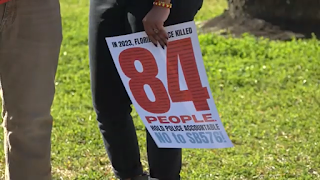WASHINGTON — In remarks pivotal to his reelection this fall, President Joe Biden in his State of the Union address Thursday night portrayed himself as the defender of democracy, touted the bipartisan deals he’s brokered during his first term in office and appealed to Congress to support Ukraine in its battle against the Russian invasion.
“My lifetime has taught me to embrace freedom and democracy,” Biden said. “A future based on the core values that have defined America: honesty, decency, dignity, equality. To respect everyone. To give everyone a fair shot. To give hate no safe harbor. Now some other people my age see a differently: an American story of resentment, revenge, and retribution. That’s not me.”
Without ever uttering his name, Biden rebuked likely Republican opponent Donald Trump by calling him “a former president” and said that Trump’s recent comments at a rally in South Carolina about allowing Russia’s military to attack NATO allies were outrageous, dangerous and unacceptable.
“History is literally watching,” Biden said. “If the United States walks away, it will put Ukraine at risk. Europe is at risk. The free world will be at risk, emboldening others to do what they wish, to do us harm.”
Biden said that “what makes our moment rare is that freedom and democracy are under attack, both at home and overseas, at the very same time.”
The president promised to seek the restoration of reproductive rights — speaking to a chamber full of Democratic women dressed in white, intended to show their support for such rights — and with a heavy emphasis on an economic agenda he vowed to reduce health care costs, impose higher taxes on the wealthy and bring back an expanded child tax credit.
Back and forth over immigration
Trump has made immigration a main theme of his campaign, and the Republican-led House earlier Thursday passed legislation named for a murdered college student from Georgia, Laken Riley, whose death has been tied by conservatives to White House immigration policies.
As Biden walked down the House aisle before the speech, Republican Rep. Marjorie Taylor Greene of Georgia, who was wearing a t-shirt bearing Riley’s name, attempted to hand Biden a button with Riley’s name on it. And when Biden mentioned immigration during his remarks, Greene continued to interrupt the president.
Biden’s address to the joint session of Congress was part campaign speech, part legislative agenda and part victory lap on the laws enacted during his first term. But it was also significant because it was the largest audience he is likely to have to himself all year, both in person and watching on television.
The speech marked an especially important moment for Biden’s reelection bid after dozens of Republicans questioned his mental faculties following Special Counsel Robert Hur’s report on classified documents, which said the president “would likely present himself to a jury, as he did during our interview of him, as a sympathetic, well-meaning, elderly man with a poor memory.”
Biden will have dozens of opportunities to take the message in his State of the Union speech directly to voters in the months ahead, beginning with a visit to the Philadelphia area on Friday and a trip to Atlanta on Saturday.
On foreign policy, Biden used the address to call for the protection of civilians in Gaza and for Hamas to release the hostages that militants have held since attacking Israel in October.
He pressed Congress to approve aid for Ukraine and Israel as well as the bipartisan border security and immigration bill that senators negotiated earlier this year — and that Republicans then dropped under pressure from Trump.
“President Roosevelt’s purpose was to wake up Congress and alert the American people that this was no ordinary time. Freedom and democracy were under assault in the world,” Biden said.
“Tonight I come to the same chamber to address the nation. Now it is we who face an unprecedented moment in the history of the Union,” Biden added. “And yes, my purpose tonight is to wake up this Congress, and alert the American people that this is no ordinary moment either.”
Biden assured lawmakers who think that Russian President Vladimir Putin will stop if he successfully overtakes Ukraine that he will not end his military campaign there.
Biden criticized Trump and Republican lawmakers in statehouses throughout the country for restricting or banning access to abortion in the last two years after the Supreme Court’s conservative justices overturned the constitutional right to end a pregnancy that had stood for nearly 50 years.
“My predecessor came into office determined to see Roe v. Wade overturned,” Biden said. “He’s the reason it was overturned and he brags about it. Look at the chaos that has resulted.”
Biden then called on voters to flip the U.S. House back to Democratic control while keeping the Senate blue during November’s elections.
“Clearly those bragging about overturning Roe v. Wade have no clue about the power of women in America,” Biden said. “But they found out when reproductive freedom was on the ballot and won in 2022, 2023, and they will find out again in 2024.”
“If Americans send me a Congress that supports the right to choose, I promise you: I will restore Roe v. Wade as the law of the land again,” Biden added.
Biden’s address touched on many of the policy issues that Americans view as important areas for lawmakers to address, according to a recent Pew Research Center survey.
About 73% of Americans view the economy as a top policy priority for the Biden administration, followed by defending against terrorism at 63% and reducing the influence of money in politics at 62%.Reducing health care costs, improving education and making Social Security financially sound all tied at 60% in the poll.
Dealing with immigration received 57% while reducing the availability of illegal drugs got 55% in the survey.
Biden also called on Congress to pass a so-called Unity Agenda that includes issues he believes Republicans and Democrats can agree on.
Those bills, he said, should increase penalties for people who traffic fentanyl, provide protections for children online, bolster artificial intelligence while protecting people from “its peril” and find new ways of treating cancer.
Biden also discussed the war in Gaza, saying that Hamas’ attack on Israel was the “deadliest day for the Jewish people since the Holocaust.”
Biden added that more than 30,000 Palestinians have been killed, “many of whom are not Hamas.”
“Israel has an added burden because Hamas hides and operates among the civilian population, like cowards – under hospitals, daycare centers and all the like,” Biden said. “But Israel also has a fundamental responsibility to protect innocent civilians in Gaza.”
Biden said the United States would lead an effort to get more humanitarian assistance through a temporary pier installed off the coast, but he called on Israel to “do its part” and allow more aid into Gaza.
“To the leadership of Israel I say this: Humanitarian assistance cannot be a secondary consideration or a bargaining chip,” Biden said. “Protecting and saving innocent lives has to be a priority.”
“As we look to the future, the only real solution to the situation is a two-state solution over time,” Biden said.
Democratic Reps. Cori Bush of Missouri, Ilhan Omar of Minnesota and Rashida Tlaib of Michigan held up small posters that called for an immediate ceasefire.
Hours before the president’s address, pro-Palestinian activists blocked roads leading to the U.S. Capitol, according to media reports.
Many activists have pushed for Biden to call for a permanent ceasefire, as Israel’s assault on Gaza since October. Voters across numerous primary states in this week’s Democratic 2024 Super Tuesday cast “uncommitted” ballots as a protest of Biden’s continued support of Israel’s bombardment in Gaza.
Republican Sen. Katie Britt of Alabama delivered the traditional Republican response to Biden after he spoke, blasting his handling of immigration, the economy, crime and foreign policy, while questioning if the 81-year-old is up to the challenge of leading the country.
“The American people are scraping by while the President proudly proclaims Bidenomics is working,” she said, seated at a kitchen table. “Goodness, y’all. Bless his heart. We know better.”
Other Republicans, such as Greene, yelled at Biden to “say her name” during his speech, referring to Riley. Greene and Troy Nehls of Texas wore pins with Riley’s name on their clothes. Greene also wore a shirt that read: “Say Her Name,” followed by Riley’s name.The “Say Her Name” is a social movement spurred by intersectional feminist Kimberlé Crenshaw that specifically raises awareness for Black women who are victims of police brutality and gender based violence.
Biden expressed his condolences to Riley’s family, saying he knew how it felt to lose a child, talking about his son, Beau, who died of cancer.
After the outburst from Greene, Biden took another swipe at Trump. He called out how the former president has used dehumanizing language to describe migrants claiming asylum at the southern border.
“I will not demonize immigrants saying they are ‘poisoning the blood of our country,’” Biden said. “I will not separate families. I will not ban people because of their faith.”
House Republicans have repeatedly clashed with the Biden administration on its policies at the southern border, as the White House deals with the largest number of migrant encounters at the U.S.-Mexico border in 20 years.
That disagreement has continued to escalate, first with the walking back of a bipartisan border security deal that would have resulted in the overhaul of U.S. immigration law. It reached a crux with the recent impeachment of U.S. Department of Homeland Security Secretary Alejandro Mayorkas in February.
Since Republicans walked away from that immigration deal, Biden has pressed for them to reconsider it, so his administration can adequately address migration at the southern border.
“Unfortunately, politics has derailed this bill so far,” Biden said. “I’m told my predecessor called members of Congress in the Senate to demand they block the bill.”
Republicans have argued that Biden can take executive action to address the border — however, immigration law is set by Congress. So far, the Biden administration has taken 535 executive actions related to immigration compared to the 472 executive actions under the Trump administration, according to an analysis by the Migration Policy Institute.
Following the speech, Senate Majority Leader Chuck Schumer pumped his fists up and down and shouted, “We are exhilarated.”
Sen. Joe Manchin III, Democrat of West Virginia, said that “the whole world is watching” what the U.S. does. He also dismissed worries about Biden’s age.
Democratic Sen. Raphael Warnock of Georgia said he was pleased to hear Biden’s support for a six-week ceasefire in Gaza, and wants to see humanitarian aid delivered quickly to the region.
Democratic Sen. Debbie Stabenow of Michigan said she felt optimistic after Biden’s speech, especially how he touched upon conservation and climate initiatives. She said she believes he’ll be supportive of the Senate’s work on the delayed farm bill.
“Our farmers need it, our families need it and our rural communities need it,” Stabenow, who chairs the Senate Committee on Agriculture, Nutrition, and Forestry, said.
Louisiana’s GOP Rep. Garret Graves said he felt Biden’s speech was more of “a campaign speech” rather than a “sincere sort of message to the American people.”
“This administration thought it was a good idea to double and triple down on stupid,” Graves said, talking about some tax proposals Biden mentioned. “The very policies that got us into this quandary that we’re in right now.”
This article originally appeared in the South Carolina Daily Gazette on March 8th, 2024
Please support the news you can use and visit The Brooks Blackboard's website for more news!
Take a look at my brief bio about my writing life and on social media:
Facebook page: The Brooks Blackboard
Twitter: @_charlesbrooks

.png)

.png)
.png)
.png)




.png)
.png)
.png)
.png)
.png)

.png)
.png)